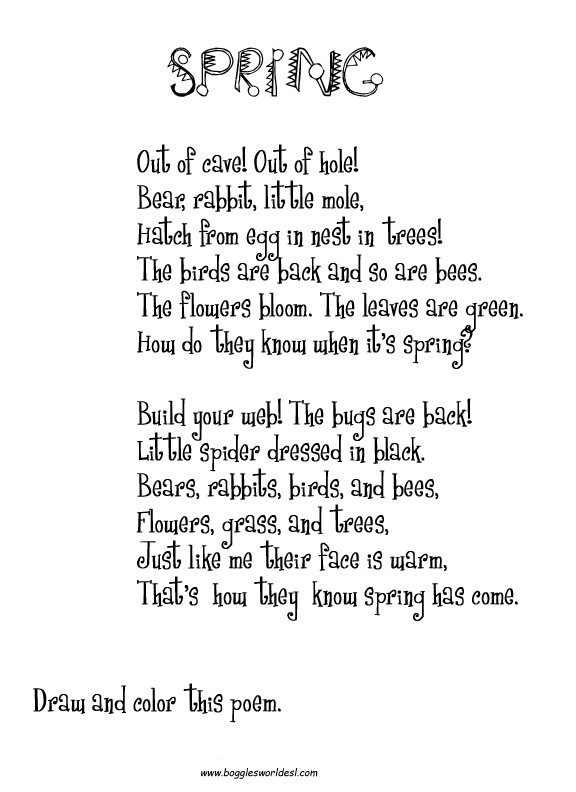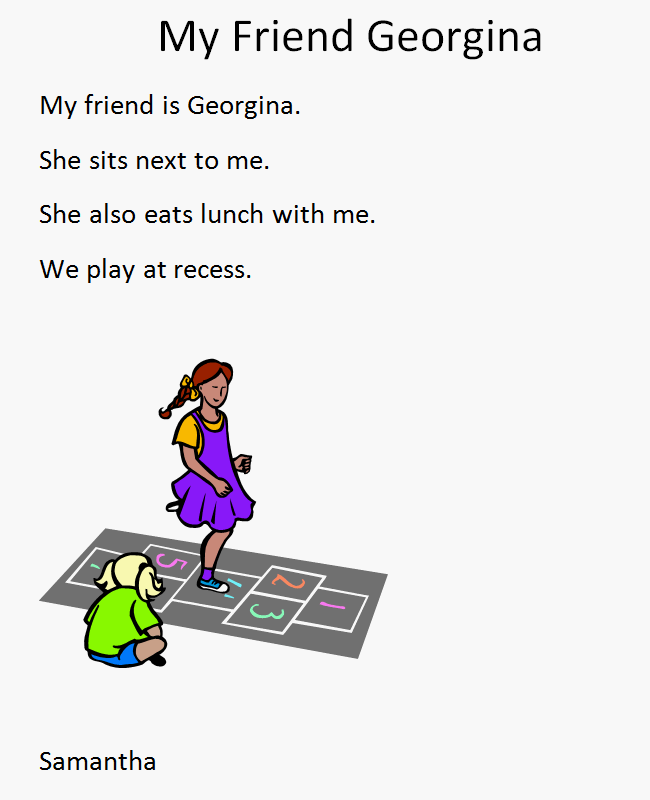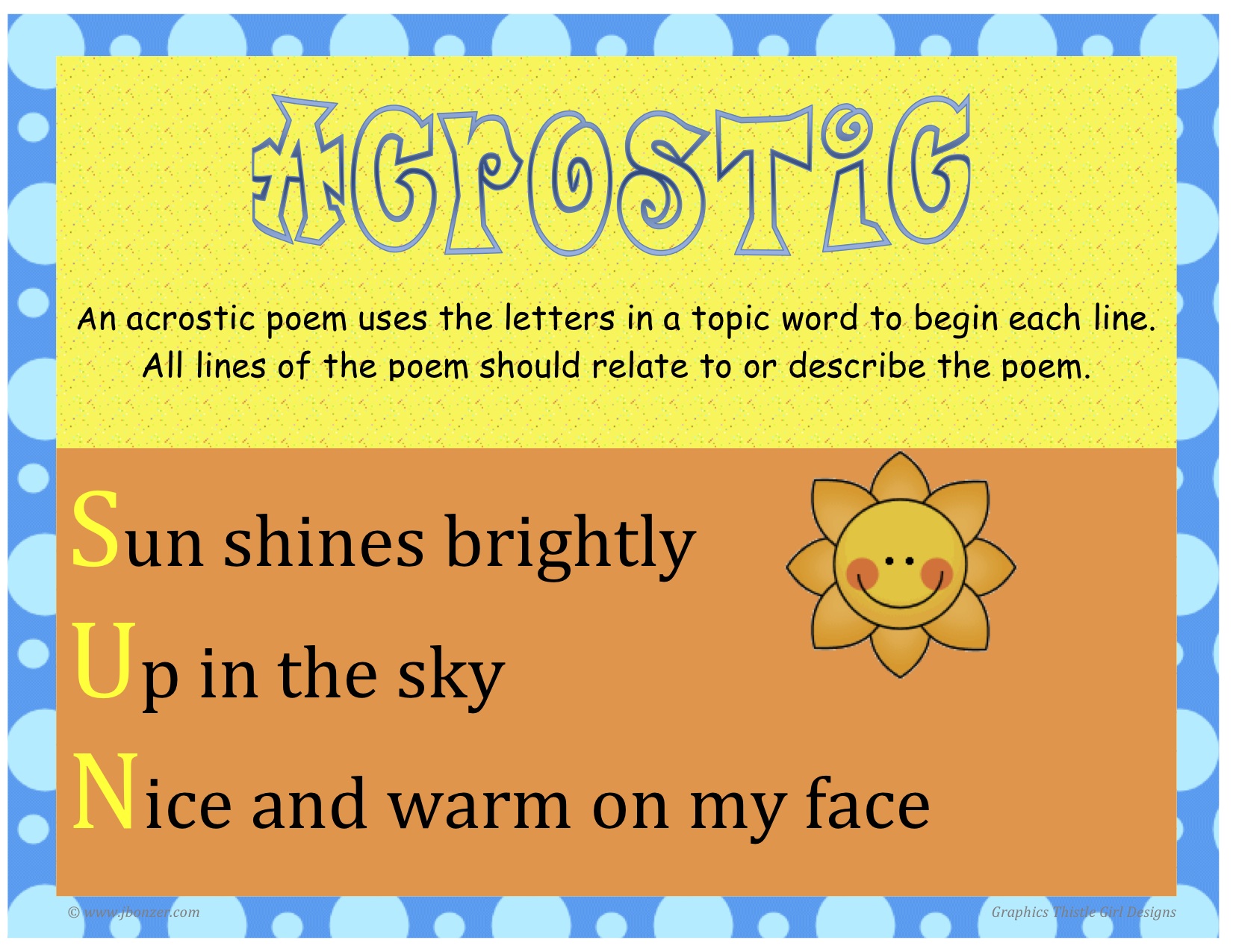Spring Poems For Kids Biography
Source(google.com.pk)
Spring poems, a celebration of the season, are written by poets in every generation. Spring is when the earth itself writes poetry and the very air becomes the poet's muse. It is no coincidence that America's National Poetry Month is in April.
This poetry collection contains the best new poems as well as the most-loved poems from previous generations. There is also a section of spring poems for kids. You can use the Table of Contents to find the section you want, or just scroll down the page to read them all.
W.S. Merwin is a prolific, leading American writer whose poetry, translations, and prose have won praise over seven decades. His first book, A Mask for Janus (1952), was chosen by W.H. Auden for the Yale Younger Poets Prize. Though that first book reflected the formalism of the period, Merwin eventually became known for an impersonal, open style that eschewed punctuation. Writing in the Guardian, Jay Parini described Merwin’s mature style as “his own kind of free verse, [where] he layered image upon bright image, allowing the lines to hang in space, largely without punctuation, without rhymes ... with a kind of graceful urgency.” Although Merwin’s writing has undergone stylistic changes through the course of his career, a recurring theme is man’s separation from nature. The poet sees the consequences of that alienation as disastrous, both for the human race and for the rest of the world. Merwin, who is a practicing Buddhist as well as a proponent of deep ecology, has lived since the late 1970s on an old pineapple plantation in Hawaii which he has painstakingly restored to its original rainforest state.
Merwin was born in New York City in 1927 and raised in New Jersey and Scranton, Pennsylvania, the son of a Presbyterian minister. Of his development as a writer, Merwin once said, “I started writing hymns for my father almost as soon as I could write at all, illustrating them ... But the first real writers that held me were not poets: Conrad first, and then Tolstoy, and it was not until I had received a scholarship and gone away to the university that I began to read poetry steadily and try incessantly, and with abiding desperation, to write it.” Merwin attended Princeton University and studied with R.P. Blackmur and John Berryman. After graduating in 1948, he continued as a post-graduate student of Romance languages and eventually traveled through much of Europe, translating poetry and working as a tutor, including for the son of poet Robert Graves. Merwin’s early collections—especially A Mask for Janus—reflect the influence of Graves and the medieval poetry Merwin was translating at the time.
Indeed, the poetic forms of many eras and societies are the foundation for a great deal of Merwin’s poetry. His first books contain many pieces inspired by diverse, classical models. According to Vernon Young in the American Poetry Review, the poems are traceable to “Biblical tales, Classical myth, love songs from the Age of Chivalry, Renaissance retellings; they comprise carols, roundels, odes, ballads, sestinas, and they contrive golden equivalents of emblematic models: the masque, the Zodiac, the Dance of Death.” In 1956, Merwin was offered a fellowship from the Poets’ Theater in Cambridge, Massachusetts and returned to the U.S. His books from this period, Green with Beasts (1956) and The Drunk in the Furnace (1960), show the beginning of a shift in style and tone as Merwin began to experiment with irregular forms. The Drunk in the Furnace, which was written during Merwin’s tenure in Boston when he was meeting poets like Robert Lowell, particularly shows his new engagement with American themes. His obsession with the meaning of America and its values can make Merwin sometimes seem like the great nineteenth-century poet Walt Whitman, critic Ed Folsom noted in Shenandoah: “His poetry ... often implicitly and sometimes explicitly responds to Whitman; his twentieth-century sparsity and soberness—his doubts about the value of America—answer, temper, Whitman’s nineteenth-century expansiveness and exuberance—his enthusiasm over the American creation.”
Merwin’s next books are his most critically acclaimed and continue to be influential volumes. The Lice (1967), though often read as a response to the Vietnam War, condemns modern man in apocalyptic and visionary terms. “These are poems not written to an agenda but that create an agenda,” wrote poet and critic Reginald Shepherd, “preserving and recreating the world in passionate words. Merwin has always been concerned with the relationship between morality and aesthetics, weighing both terms equally. His poems speak back to the fallen world not as tracts but as artistic events.” The Lice remains one of Merwin’s best-known volumes of poetry. His next book, The Carrier of Ladders (1970) won the Pulitzer Prize for poetry in 1971. He famously donated the prize money to the draft resistance movement, writing an essay for the New York Review of Books that outlined his objections to the Vietnam War. His article spiked the ire of W.H. Auden, who wrote a response arguing that the award was apolitical. The Carrier of Ladders shows Merwin continuing to engage with American themes and nature, and includes a long sequence on American westward expansion. That same year, Merwin published The Miner’s Pale Children: A Book of Prose. Reviewing both volumes for the New York Times, Helen Vendler noted that “these books invoke by their subtitles the false distinction between prose and poetry: the real distinction is between prose and verse, since both are books of poems, with distinct resemblances and a few differences.”
Merwin moved to Hawaii to study Zen Buddhism in 1976. He eventually settled in Maui and began to restore the forest surrounding his former plantation. Both the rigor of practicing Buddhism and the tropical landscape have greatly influenced Merwin’s later style. His next books increasingly show his preoccupation with the natural world. The Compass Flower (1977), Opening the Hand (1983), and The Rain in the Trees (1988) “are concerned not only with what to renounce in the metropolis but also what to preserve in the country,” noted Ed Hirsch in the New York Times. Many of the poems in the last volume “immerse themselves in nature with a fresh sense of numinousness,” said Hirsch, while also mourning the loss of that nature to human greed and destruction. Merwin has continued to produce striking poems using nature as a backdrop. The Vixen (1996), for instance, is an exploration of the rural forest in southwestern France that Merwin called home for many years. Poet-critic J. D. McClatchy remarked in the New Yorker that “the book is suffused with details of country life—solitary walks and garden work, woodsmoke, birdsong, lightfall.” But Merwin’s later poetry doesn’t merely describe the natural world; it also records and condemns the destruction of nature, from the felling of sacred forests to the extinction of whole species. Migration: New and Selected Poems (2005) exposes Merwin’s evolution as a stylist over half a century but also shows, as Ben Lerner noted in his review of the volume for Jacket, that “Merwin ... is an unwaveringly political poet ... [he] not only tracks the literal impoverishment of our planet, but he makes it symbolize the impoverishment of our culture’s capacity for symbolization.” Migration was awarded the National Book Award for poetry.
Some literary critics have identified Merwin with the group known as the oracular poets, but Merwin himself once commented: “I have not evolved an abstract aesthetic theory and am not aware of belonging to any particular group of writers.” Reviewing Migration for the New York Times, Dan Chiasson described Merwin poems as “secular prophecy grounded on perceptual fineness.” But while Merwin’s work from the 1960s and early ‘70s perhaps best embody this mode, Chiasson believed that “its signature open form has been preserved whatever the occasion. What began as stylistic necessity has become a mannerism.” Merwin has continued to win high praise for his poetry, however, including the 2009 Pulitzer Prize for his collection The Shadow of Sirius (2008). The book’s three sections deal with childhood and memory, death and wisdom, and are some of the most autobiographical of his career. The Pulitzer Prize committee cited the book for its “luminous, often-tender poems that focus on the profound power of memory.”
In addition to writing poetry, prose and drama, Merwin is an accomplished and prolific translator of poetry. Merwin has also translated poets as diverse as Osip Mandelstam and Pablo Neruda. His translation of Dante’s Purgatorio (2000) and the Middle English epic Sir Gawain and the Green Knight (2004) both won high praise for their graceful, accessible language, and his Selected Translations (2013) won the Harold Morton Landon Translation Award.
Merwin has won most awards available to American poets, including the Bollingen Prize, two Pulitzer Prizes, the Aiken Taylor Award for Modern American Poetry, a Ford Foundation grant, the Ruth Lilly Poetry Prize, the PEN Translation Prize, the Shelley Memorial Award, the Wallace Stevens Award, and a Lila Wallace-Reader’s Digest Writers’ Award. He has also been awarded fellowships from The Academy of American Poets, the Guggenheim Foundation, the National Endowment for the Arts, and the Rockefeller Foundation. Merwin is a former chancellor of the Academy of American Poets and two-time U.S. poet laureate (1999-2000, 2010-2011).
Merwin was once asked what social role a poet plays—if any—in America. He commented: “I think there’s a kind of desperate hope built into poetry now that one really wants, hopelessly, to save the world. One is trying to say everything that can be said for the things that one loves while there’s still time. I think that’s a social role, don’t you? ... We keep expressing our anger and our love, and we hope, hopelessly perhaps, that it will have some effect. But I certainly have moved beyond the despair, or the searing, dumb vision that I felt after writing The Lice; one can’t live only in despair and anger without eventually destroying the thing one is angry in defense of. The world is still here, and there are aspects of human life that are not purely destructive, and there is a need to pay attention to the things around us while they are still around us. And you know, in a way, if you don’t pay that attention, the anger is just bitterness.”
[Updated 2010]
CAREER
Poet. Tutor in France and Portugal, 1949; tutor of Robert Graves's son in Majorca, 1950; lived in London, England, 1951-54, supporting himself largely by doing translations of Spanish and French classics for British Broadcasting Corporation (BBC) Third Programme; playwright for Poets' Theatre, Cambridge, MA, 1956; lived in New York, NY, 1961-63; associated with Roger Planchon's Theatre de la Cite, Lyon, France, ten months during 1964-65; moved to Hawaii in the late 1970s. In 1999, Merwin was named Poetry Consultant to the Library of Congress for a jointly-held position with poets Rita Dove and Louise Glück.
BIBLIOGRAPHY
POETRY
A Mask for Janus, Yale University Press (New Haven, CT), 1952.
The Dancing Bears, Yale University Press (New Haven, CT), 1954.
Green with Beasts, Knopf (New York, NY), 1956.
The Drunk in the Furnace, Macmillan (New York, NY), 1960.
The Moving Target, Atheneum (New York, NY), 1963.
Collected Poems, Atheneum (New York, NY), 1966.
The Lice, Atheneum (New York, NY), 1969.
Animae, Kayak (San Francisco, CA), 1969.
The Carrier of Ladders, Atheneum (New York, NY), 1970.
(With A.D. Moore) Signs, Stone Wall Press (Iowa City, IA), 1970.
Asian Figures, Atheneum (New York, NY), 1973.
Writings to an Unfinished Accompaniment, Atheneum (New York, NY), 1973.
The First Four Books of Poems (contains A Mask for Janus, The Dancing Bears, Green with Beasts, and The Drunk in the Furnace), Atheneum (New York, NY), 1975.
The Compass Flower, Atheneum (New York, NY), 1977.
Feathers from the Hill, Windhover (Iowa City, IA), 1978.
Finding the Islands, North Point Press (San Francisco, CA), 1982.
Opening the Hand, Atheneum (New York, NY), 1983.
The Rain in the Trees: Poems, Knopf (New York, NY), 1988.
Selected Poems, Atheneum (New York, NY), 1988.
Travels: Poems, Knopf (New York, NY), 1993.
The Vixen: Poems, Knopf (New York, NY), 1996.
Flower and Hand: Poems, 1977-1983, Copper Canyon Press (Port Townsend, WA), 1996.
East Window: The Asian Poems, Copper Canyon Press (Port Townsend, WA), 1998.
The River Sound: Poems, Knopf (New York, NY), 1999.
The Pupil, Knopf (New York, NY), 2001.
Migration: New and Selected Poems, Copper Canyon Press (Port Townsend, WA), 2005.
Present Company, Copper Canyon Press (Port Townsend, WA), 2005.
The Shadow of Sirius, Copper Canyon Press (Port Townsend, WA), 2008.
The Collected Poems of W.S. Merwin, Library of America (New York), 2013.
The Moon Before Morning, Coppery Canyon Press(Port Townsend, WA), 2014.
Contributor to numerous anthologies. Merwin's poems have been recorded for the Archive of Recorded Poetry and Literature, 1994. Contributor to magazines, including Nation, Harper's, Poetry, New Yorker, Atlantic, Kenyon Review, and Evergreen Review. Poetry editor, Nation, 1962. A reader, with others, on sound recordings, including Poetry and the American People: Reading, Voice, and Publication in the 19th and 20th Centuries, Library of Congress Bicentennial Symposium, 2000; Poetry in America: Favorite Poems: An Evening of Readings and a Special Favorite Poem Audio and Video Presentation, Library of Congress (Washington, DC), 2000; An Evening of Dante in English Translation, Library of Congress (Washington, DC), 2000. The W.S. Merwin Archive in the Rare Book Room of the University Library of the University of Illinois at Urbana-Champaign contains notes, drafts, and manuscripts of published and unpublished work by Merwin from the mid-1940s to the early 1980s.
PROSE
The Miner's Pale Children, Atheneum (New York, NY), 1970, reprinted, Holt (New York, NY), 1994.
Houses and Travellers, Atheneum (New York, NY), 1977, reprinted, Holt (New York, NY), 1994.
Unframed Originals: Recollections, Atheneum (New York, NY), 1982.
The Lost Upland, Knopf (New York, NY), 1992.
The Folding Cliffs: A Narrative, Knopf (New York, NY), 1998.
The Mays of Ventadorn (National Geographic Direction Series), National Geographic (Washington, DC), 2002.
The Ends of the Earth, Shoemaker & Hoard (Washington, DC), 2004.
Unchopping a Tree, drawings by Elizabeth Ward, Trinity University Press (San Antonio), 2014.
EDITOR
West Wind: Supplement of American Poetry, Poetry Book Society (London, England), 1961.
Lament for the Makers: A Memorial Anthology, Counterpoint (Washington, DC), 1996.
TRANSLATOR
The Poem of the Cid, Dent (London, England), 1959, New American Library (New York, NY), 1962.
(Contributor) Eric Bentley, editor, The Classic Theatre, Doubleday (New York, NY), 1961.
The Satires of Persius, Indiana University Press (Bloomington, IN), 1961.
Some Spanish Ballads, Abelard (London, England), 1961, published as Spanish Ballads, Doubleday Anchor (New York, NY), 1961.
The Life of Lazarillo de Tormes: His Fortunes and Adversities,Doubleday Anchor (New York, NY), 1962.
(Contributor) Medieval Epics, Modern Library (New York, NY), 1963.
(With Denise Levertov, William Carlos Williams, and others) Nicanor Parra, Poems and Antipoems, New Directions (New York, NY), 1968.
Jean Follain, Transparence of the World, Atheneum (New York, NY), 1969, reprinted, Copper Canyon Press (Port Townsend, WA), 2003.
W.S. Merwin: Selected Translations, 1948-1968, Atheneum (New York, NY), 1969.
(And author of introduction) S. Chamfort, Products of the Perfected Civilization: Selected Writings of Chamfort, Macmillan (New York, NY), 1969.
Porchia, Voices: Selected Writings of Antonio Porchia, Follett (Chicago, IL), 1969, reprinted, Copper Canyon Press (Port Townsend, WA), 2003.
Pablo Neruda, Twenty Poems and a Song of Despair, Cape (London, England), 1969, reprinted, with introduction by Christina García, illustrations by Pablo Picasso, Penguin Books (New York, NY), 2004.
(With others) Pablo Neruda, Selected Poems, Dell (New York, NY), 1970.
(With Clarence Brown) Osip Mandelstam, Selected Poems, Oxford University Press (New York, NY), 1973, reprinted as The Selected Poems of Osip Mandelstam, New York Review of Books (New York, NY), 2004.
(With J. Moussaieff Mason) Sanskrit Love Poetry, Columbia University Press (New York, NY), 1977, published as Peacock's Egg: Love Poems from Ancient India, North Point Press (San Francisco, CA), 1981.
Roberto Juarroz, Vertical Poems, Kayak (San Francisco, CA), 1977.
(With George E. Dimock, Jr.) Euripides, Iphigenia at Aulius, Oxford University Press (New York, NY), 1978.
Selected Translations, 1968-78, Atheneum (New York, NY), 1979.
Robert the Devil, Windhover (Iowa City, IA), 1981.
Four French Plays, Atheneum (New York, NY), 1984.
From the Spanish Morning, Atheneum (New York, NY), 1984.
Dante Alighieri, Purgatorio, Knopf (New York, NY), 2000.
Gawain and the Green Knight, a New Verse Translation, Knopf (New York, NY), 2004.
Collected Haiku of Yosa Buson, Copper Canyon Press (Port Townsend, WA), 2013.
Selected Translations: Translations from 1948-2010, Copper Canyon Press (Port Townsend, WA), 2013.
Also translator of Lope de Rueda, "Eufemia," in Tulane Drama Review, December, 1958; Lesage, "Crispin," in Tulane Drama Review; Lope Felix de Vega Carpio, Punishment without Vengeance, 1958; Federico García Lorca, "Yerma" and "Blood," 1969.
PLAYS
(With Dido Milroy) Darkling Child, produced, 1956.
Favor Island, produced at Poets' Theatre, Cambridge, MA, 1957, and on British Broadcasting Corporation Third Programme, 1958.
The Gilded West, produced at Belgrade Theatre, Coventry, England, 1961.
FURTHER READING
BOOKS
Brunner, Edward J., Poetry As Labor and Privilege: The Writings of W.S. Merwin, University of Illinois Press (Urbana, IL), 1991.
Christhilf, Mark, W.S. Merwin the Mythmaker, University of Missouri Press (Columbia, MO), 1986.
Contemporary Literary Criticism, Thomson Gale (Detroit, MI), Volume 1, 1973, Volume 2, 1974, Volume 3, 1975, Volume 5, 1976, Volume 8, 1978, Volume 13, 1980, Volume 18, 1981.
Contemporary Poets, 6th edition, St. James Press (Detroit, MI), 1996.
Davis, Cheri, W.S. Merwin, Twayne (Boston, MA), 1981.
Dickey, James, Babel to Byzantium, Farrar, Straus (New York, NY), 1968.
Dictionary of Literary Biography, Volume 5: American Poets since World War II, Thomson Gale (Detroit, MI), 1980.
Hix, H. L., Understanding W.S. Merwin, University of South Carolina Press (Columbia, SC), 1997.
Hoeppner, Edward Haworth, Echoes and Moving Fields: Structure and Subjectivity in the Poetry of W.S. Merwin and John Ashbery, Associated University Presses (Cranberry, NJ), 1994.
Howard, Richard, Alone with America: Essays on the Art of Poetry in the United States since 1950, Atheneum (New York, NY), 1969.
Hungerford, Edward, Poets in Progress, Northwestern University Press (Evanston, IL), 1962.
Nelson, Cary, and Ed Folsom, editors, W.S. Merwin: Essays on the Poetry, University of Illinois Press (Urbana, IL), 1987.
Poetry for Students, Volume 5, Thomson Gale (Detroit, MI), 1999.
Rexroth, Kenneth, With Eye and Ear, Herder (New York, NY), 1970.
Rexroth, Kenneth, American Poetry in the Twentieth Century, Herder (New York, NY), 1971.
Rosenthal, M. L., The Modern Poets: A Critical Introduction, Oxford University Press (New York, NY), 1960.
Shaw, Robert B., editor, American Poetry since 1960: Some Critical Perspectives, Dufour (Chester Springs, PA), 1974.
Stepanchev, Stephen, American Poetry since 1945, Harper (New York, NY), 1965.
PERIODICALS
American Poetry Review, January-February, 1978;May-June 2004, Margaret Atwood, review of The Mays of Ventadorn, p. 29.
Antioch Review, winter, 2006, F.D. Reeve, review of Migration: New and Selected Poems, p. 189.
Booklist, November 1, 1996, review of Lament for the Makers: A Memorial Anthology, p. 476; January 1, 1999, review of The Folding Cliffs: A Narrative, p. 777; March 15, 1999, review of The Folding Cliffs, p. 1276; June 1, 2002, Will Hickman, review of The Mays of Ventadorn, p. 1668; September 1, 2005, Donna Seaman, review of Present Company and Summer Doorways, p. 43.
Chicago Tribune Book World, December 26, 1982.
Commonweal, June 18, 1999, review of The Folding Cliffs, p. 24.
Concerning Poetry, spring, 1975.
Furioso, spring, 1953.
Hudson Review, winter, 1967-68; summer, 1973; spring, 1999, review of The Folding Cliffs, p. 141.
Iowa Review, winter, 1982, Cary Nelson and Ed Folsom, "Fact Has Two Faces: An Interview with W.S. Merwin," pp. 30-66.
Kirkus Reviews, March 15, 2004, review of The Ends of the Earth: Essays, p.260; July 1, 2005, review of Summer Doorways, p. 721.
Library Journal, January, 1996, p. 104; October 15, 1998, review of The Folding Cliffs, p. 74; November 1, 1996, review of Lament for the Makers, p. 71; November 15, 2001, Ellen Kaufman, review of The Pupil: Poems, p. 71; July, 2004, Maureen J. Delaney-Lehman, review of The Ends of the Earth, p. 83; September 1, 2005, Fred Muratori, review of Present Company, p. 147.
Los Angeles Times, August 21, 1983.
Los Angeles Times Book Review, August 21, 1983.
Modern Language Quarterly, March, 1983, pp. 65-79; September, 1988, pp. 262-284.
Modern Poetry Studies, winter, 1975.
Nation, December 14, 1970; December 12, 1994, Gerald Stern, "The Lenore Marshall Poetry Prize-1994," p. 733.
New Leader, January 13, 1997, review of Lament for the Makers, p. 15; December 14, 1998, review of The Folding Cliffs, p. 23.
New Mexico Quarterly, autumn, 1964.
New Republic, March 22, 1999, review of The River Sound: Poems and The Folding Cliffs, p. 40.
New Yorker, June 3, 1996, J. D. McClatchy, review of The Vixen: Poems, p. 92; December, 7, 1998, review of The Folding Cliffs, p. 200.
New York Review of Books, May 6, 1971; September 20, 1973; March 27, 1997, review of The Vixen and Lament for the Makers, p. 18.
New York Times Book Review, October 18, 1970; June 19, 1977; August 1, 1982; October 9, 1983; April 4, 1999, Melanie Rehak, "Poetic Justice"; June 6, 1999, review of The River Sound, p. 37; December 5, 1999, review of The River Sound, p. 78.
New York Times Magazine, February 19, 1995, p. 39.
Ontario Review, fall-winter, 1977-78.
Partisan Review, summer, 1958; winter, 1971-72.
Poet and Critic, spring, 1990, pp. 37-40.
Poetry, May, 1953; May, 1961; February, 1963; June, 1964; August, 1974; November, 2005, David Biespiel, "Iron Man," p. 137.
Prairie Schooner, fall, 1957; fall, 1962; winter, 1962-63; fall, 1968; winter, 1971-72.
Publishers Weekly, November, 27, 1995, p. 65; February 24, 1997, review of Flower and Hand: Poems, 1977-1983, p. 86; August 15, 2005, review of Present Company, p. 35.
Sewanee Review, spring, 1974.
Shenandoah, spring, 1968; winter, 1970; spring, 1978.
Southern Review, April, 1980.
Village Voice, July 4, 1974.
Virginia Quarterly Review, summer, 1973; spring, 1997, review of Lament for the Makers, p. 48; spring, 1999, review of The Folding Cliffs, p. 67; autumn, 1999, review of The River Sound, p. 136.
Voices, January-April, 1953; May-August, 1957; September-December, 1961.
Washington Post Book World, August 31, 1975; September 18, 1977; August 15, 1982; June 3, 1984.
Western Humanities Review, spring, 1970; spring, 1971.
Western Review, spring, 1955.
World Literature Today, autumn, 1996, review of The Vixen, p. 964; spring, 1997, review of Lament for the Makers, p. 391; autumn, 2000, review of The River Sound, p. 820; April-June 2003, John Boening, review of The Pupil, p. 104.
Spring Poems For Kids Poems For Kids About School That Rhyme Shel Silverstein in English To Recite About Friends in Urdu About Friendship

Spring Poems For Kids Poems For Kids About School That Rhyme Shel Silverstein in English To Recite About Friends in Urdu About Friendship

Spring Poems For Kids Poems For Kids About School That Rhyme Shel Silverstein in English To Recite About Friends in Urdu About Friendship

Spring Poems For Kids Poems For Kids About School That Rhyme Shel Silverstein in English To Recite About Friends in Urdu About Friendship

Spring Poems For Kids Poems For Kids About School That Rhyme Shel Silverstein in English To Recite About Friends in Urdu About Friendship

Spring Poems For Kids Poems For Kids About School That Rhyme Shel Silverstein in English To Recite About Friends in Urdu About Friendship

Spring Poems For Kids Poems For Kids About School That Rhyme Shel Silverstein in English To Recite About Friends in Urdu About Friendship

Spring Poems For Kids Poems For Kids About School That Rhyme Shel Silverstein in English To Recite About Friends in Urdu About Friendship

Spring Poems For Kids Poems For Kids About School That Rhyme Shel Silverstein in English To Recite About Friends in Urdu About Friendship

Spring Poems For Kids Poems For Kids About School That Rhyme Shel Silverstein in English To Recite About Friends in Urdu About Friendship

Spring Poems For Kids Poems For Kids About School That Rhyme Shel Silverstein in English To Recite About Friends in Urdu About Friendship

















































